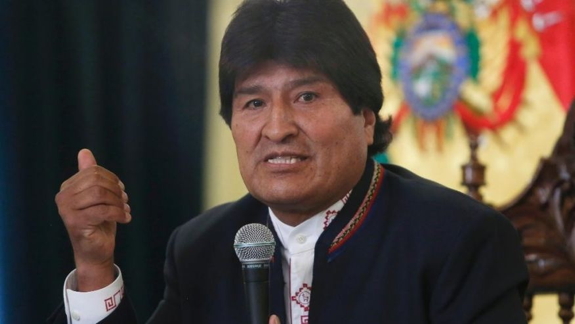
(below) FILE - In this Feb. 24, 2016 file photo, Bolivia's President Evo Morales speaks during a press conference at the government palace in La Paz, Bolivia. Morales has failed to convince some of his biggest political allies that he should be allowed to remain in power. Powerful unions in the Andean country said Thursday, May 26, 2016 that Morales should focus on solving growing social conflict instead of seeking another term. (AP Photo/Juan Karita, File) (The Associated Press)
Some allies of Bolivia's leader cool to him staying in power
May 26, 2016 - Fox News
LA PAZ, Bolivia — President Evo Morales is finding that some of his biggest allies are cool to the idea of letting him try again to amend Bolivia's constitution so he could run for re-election.
The Bolivian Workers Central group and other powerful unions in the Andean country said Thursday that Morales should focus on solving social conflicts instead of seeking another term.
In February, Morales suffered his first direct electoral defeat in a decade in power when voters narrowly rejected a constitutional amendment that would have let him run again in 2019. Morales also has been hit by social protests, an influence-peddling scandal involving a former lover and a weakening economy.
"It's not the time to discuss the (re-election) when we're in the middle of a national conflict," said Guido Mitma, leader of the Bolivian Workers Central group.
Keep Reading
The union has traditionally backed Morales. But last week, it organized a protest against the government's decision to close Bolivia's largest state-run textile company. The demonstration turned violent when anti-riot police and workers clashed.
"We're not talking about political support, what we want is a solution to the layoffs," Victor Quispe, of the country's textile confederation, said about the more than 800 workers who lost their jobs when the company closed.
Morales hinted this week that he would seek a second referendum after losing February's ballot question by 51 percent to 49 percent. The opposition says that would be illegal. But the coca-growers union Morales has led is supporting the plan.
The president's supporters argue he lost the referendum only because of a lie about a supposed love child with his former girlfriend.
A judge recently ruled the alleged son does not exist as Morales' former lover, Gabriela Zapata, claimed. She has been arrested and charged with illegal enrichment, laundering of unjust gains and influence trafficking as part of a probe by the government's anti-corruption agency into a Chinese company that has won more than $500 million worth of contracts with the state.
Trust in the government has eroded since the corruption case. The opposition has accused Morales of benefiting from the contracts. He denies that.
Morales, Bolivia's first indigenous president, presided over an unprecedented economic boom as prices for raw materials skyrocketed just as he began the first of his three terms. He built airports and highways and put a Chinese-built satellite into space.
He also helped lift millions out of poverty by distributing natural gas revenues, spurring the creation of an indigenous middle class.
But the boom is over. Bolivia's revenues from natural gas and minerals, making up three-fourths of its exports, were down more than 30 percent last year. Economists say Morales relied too heavily on extractive industries to pay for populist programs and failed to diversify the economy.